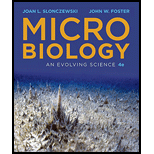
Microbiology: An Evolving Science (Fourth Edition)
4th Edition
ISBN: 9780393615098
Author: John W. Foster, Joan L. Slonczewski
Publisher: W. W. Norton & Company
expand_more
expand_more
format_list_bulleted
Concept explainers
Question
Chapter 17.6, Problem 1TQ
Summary Introduction
To review:
The cellular entities apart from chloroplast and mitochondria that may have evolved from endosymbionts.
Introduction:
Coevolution is the parallel evolution of two or more interacting species. It occurs as a result of different forms of symbiosis like
Expert Solution & Answer
Want to see the full answer?
Check out a sample textbook solution
Students have asked these similar questions
In the late 1960s (and since), Lynn Margulis (and others) provided considerable evidence for the endosymbiotic theory of the origin of various organelles in eukaryotic cells.What is the endosymbiotic theory? Which two eukaryotic organelles were proposed to have arisen as endosymbionts? What evidence did Margulis present to support each organelle as an endosymbiont?
Describe the features of mitochondria and chloroplasts that support the endosymbiotic theory.
How did endosymbiosis contribute to the evolution of eukaryotes?
Chapter 17 Solutions
Microbiology: An Evolving Science (Fourth Edition)
Knowledge Booster
Learn more about
Need a deep-dive on the concept behind this application? Look no further. Learn more about this topic, biology and related others by exploring similar questions and additional content below.Similar questions
- Define the endosymbiotic theory. Explain how mitochondria and chloroplasts evolved by endosymbiosis. Explain 4 pieces of evidence for the Endosymbiotic Theory.arrow_forwarddescribe a scenario for the evolutionary origin of protist chloroplasts?arrow_forwardHow are forams useful for researchers to study changes in ocean temperature over time? What are mixotrophs? What is endosymbiosis and why is it consider to be the source of eukaryotic diversity? Why are we confident this only happens once? What is primary and secondary endosymbiosis? Was there another endosymbiotic event that led to a third lineage? What group of organisms possesses a structure that might suggest this possibility and what is the structure? Why is the structure question different from the ancestor of other plastids? What are diatom blooms and why are they of particular interest to climate change scientists?arrow_forward
- Symbiosis has had a role in eukaryotic development?arrow_forwardWhat evidence supports the hypothesis that mitochondriapreceded plastids in the evolution of eukaryotic cells?arrow_forwardWhat is endosymbiosis and why is it considered to be the source of eukaryotic diversity? Why are we confident this only happened once? What is primary and secondary endosymbiosis? Was there another endosymbiotic event that led to a third lineage? What group of organisms possesses a structure that might suggest this possibility and what is the structure? Why is the structure in question different from the ancestor of other plastids?arrow_forward
- In lecture, we discussed the endosymbiont theory that describes the evolutionary origins of mitochondria and chloroplast. A few scientists think that peroxisomes also have an endosymbiotic evolutionary origin, although most scientists disagree with this hypothesis. Which of the following hypothetical discoveries would provide support for the hypothesis that peroxisomes evolved from bacteria? Discovering that eukaryotic cells cannot live without peroxisomes. All of these hypothetical discoveries would provide support for the hypothesis that peroxisomes have an endosymbiotic evolutionary origin. Identifying the presence of DNA within peroxisomes. Determining that the majority of proteins in peroxisomes have eukaryotic origin.arrow_forwardCompare the phylogenetic tree of protists with the secondary endosymbiosis theory which proposes how photosynthetic protists evolved. Are both reconcilable? Explain.arrow_forwardExcept for the Plantae, what best describes the origin of chloroplasts in most other eukaryotes? Group of answer choices Chloroplasts evolved independently in different lineages Primary endosymbiosis An amoeboid protist engulfed another protist that had chloroplasts in its tissues Mitochondria were converted to perform photosynthetic functions Eukaryotes outside the Plantae don’t have chloroplastsarrow_forward
- What is the evidence that the metamonads, which lack mitochondria, derive from ancestors that had mitochondria rather than from ancestors that were in lineages that never contained mitochondria?arrow_forwardWould the evidence suggest that mitochondria or chloroplasts were the first to evolve through endosymbiosis?arrow_forwardDescribe two ways in which paramecium differs from the projected traits of the last eukaryotic common ancestor.arrow_forward
arrow_back_ios
SEE MORE QUESTIONS
arrow_forward_ios
Recommended textbooks for you
 Biology: The Dynamic Science (MindTap Course List)BiologyISBN:9781305389892Author:Peter J. Russell, Paul E. Hertz, Beverly McMillanPublisher:Cengage Learning
Biology: The Dynamic Science (MindTap Course List)BiologyISBN:9781305389892Author:Peter J. Russell, Paul E. Hertz, Beverly McMillanPublisher:Cengage Learning

Biology: The Dynamic Science (MindTap Course List)
Biology
ISBN:9781305389892
Author:Peter J. Russell, Paul E. Hertz, Beverly McMillan
Publisher:Cengage Learning
Endosymbiotic Theory; Author: Amoeba Sisters;https://www.youtube.com/watch?v=FGnS-Xk0ZqU;License: Standard Youtube License